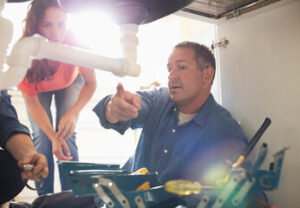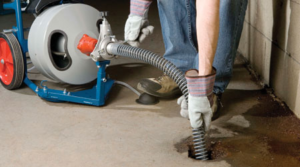Plumbing is an essential service for every home and business, ensuring that there is clean water supply and proper drainage. The profession provides a range of interesting and challenging work, from installing pipes to repairing and maintaining gas systems.

Plumbers also play a crucial role in economic growth, allowing businesses to operate smoothly and efficiently with reliable plumbing systems. They help reduce the risk of diseases such as cholera by ensuring safe water for communities. Contact Plumber Sarasota for professional help.
There are a few different routes to becoming a plumber. Some choose to attend a vocational school or community college that offers courses in plumbing, while others take on an apprenticeship program. Apprenticeships typically last from four to five years and combine on-the-job training with classroom instruction. Apprentices learn the skills of their trade from experienced plumbers while earning a regular wage. Classroom instruction focuses on topics like local plumbing codes and regulations, blueprint reading, and safety.
Aspiring plumbers can also find entry-level jobs with construction companies or contractors, working weekends and holidays to gain experience in the industry. This work can help to build up a portfolio of relevant job experience that can be used when applying for an apprenticeship or entering the plumbing profession full-time.
Plumbers need to have a wide range of skills and competencies to perform their job duties effectively. These include the ability to diagnose and repair problems with water supply and drainage systems; the knowledge of how to install and maintain pipes, faucets, fixtures, appliances, and other plumbing components; and the ability to use a variety of tools including power tools. Plumbing work often involves working in tight spaces and around dangerous materials, so it is important for plumbers to be comfortable with these conditions and follow all proper safety protocols.
Because plumbing problems can occur at any time, plumbers must be available to respond to calls for service. This may require them to work evenings, weekends, and on-call shifts. This can have a significant impact on their personal lives, but it is a necessary part of the job. In addition, plumbers often need to continue their education and keep up-to-date on the latest tools and techniques in the plumbing industry.
Some plumbers choose to become self-employed and run their own plumbing businesses. This can be a rewarding option for those who enjoy independence and the flexibility to choose their own projects and hours. However, it is important for self-employed plumbers to be familiar with all aspects of plumbing and to carry out all responsibilities and duties in a safe and responsible manner.
Job Duties
Plumbers are responsible for installing, repairing and maintaining pipes and fixtures. They also work on water supply lines and waste disposal systems in commercial and industrial spaces. Plumbers need to have excellent customer service skills and be able to troubleshoot problems quickly and efficiently. They must also be able to read blueprints and understand building codes when installing new plumbing systems.
After completing their initial education, plumbers typically enter an apprenticeship program that lasts four to five years and combines on-the-job training with classroom instruction. During this time, they learn the trade from more experienced plumbers while earning a salary. Once they have completed their apprenticeship, plumbers can become licensed journeymen. Some choose to start their own plumbing businesses or become contractors.
The job duties of a plumber include installing, repairing and maintaining pipes, fixtures and appliances like sinks, toilets and water heaters. They may also be required to perform minor electrical work. Plumbers need to be familiar with a variety of tools, including hand tools and power equipment such as wrenches, pipe cutters and drain snakes. They are also required to adhere to all state and local laws pertaining to plumbing.
This question assesses the candidate’s knowledge of the company’s mission and how they think they can contribute to its success as a plumber. It also helps to determine if their professional values align with the company’s goals and culture.
In addition to working on pipes, plumbers are often responsible for inspecting and repairing other construction components, such as doors, windows and walls. They must be able to identify potential issues before they cause significant damage and work with general contractors to ensure that all aspects of the project are progressing according to plan. Plumbers also need to be able to effectively communicate with clients in order to explain the nature of their problem and how it can be fixed.
In some cases, plumbers must also take on administrative duties such as invoicing, scheduling and assisting other staff members. They must also keep accurate records of the time spent on each job and submit them to their supervisors. They must also maintain a safe and clean work environment and follow all company policies and procedures.
Work Environment
A career as a plumber offers many benefits, including good pay and job stability. It is a hands-on and varied position that requires a strong grasp of engineering principles and building regulations to perform well. However, plumbers must also be physically strong and able to work in cramped spaces and around sharp tools. Those who enjoy working with their hands and solving problems will find the work fulfilling.
The plumbing industry is a trade that does not require a university degree, but it is essential to have adequate training and certification to practice as a professional plumber. Plumbers must be competent in a range of tasks, such as laying out pipe systems, inspecting and testing water pressure levels, diagnosing plumbing problems and repairing pipes and fixtures. They must also be capable of connecting appliances like dishwashers and washing machines to the plumbing system, as well as repairing and maintaining toilets, showers, bathtubs and sinks.
Many plumbers operate independently, although some work for large companies or construction sites. Plumbers on construction sites work alongside other tradespeople to construct new buildings according to plans and specifications. This environment may involve working in confined spaces, such as crawl spaces and basements, or on high rise buildings. In these settings, it is common for plumbers to be on-call to address emergency situations and may require a flexible schedule.
Plumbers can also be found in commercial and industrial settings, where they install, repair, and maintain plumbing systems for a wide variety of occupants, such as office buildings, retail stores, hospitals, and factories. These environments often require a greater level of collaboration and coordination between plumbers, engineers, and construction teams to ensure that all components are working correctly and safely.
A typical day for a plumber begins with the preparation of materials, tools and equipment before the start of the shift. Then, the plumber travels to the job site, which may be a home, an apartment building or an industrial facility. The work environment can be very noisy and dirty, as plumbers must contend with dust, dirt, chemicals, and other debris. This is why it is important for plumbers to use proper ventilation when working in tight or confined spaces. It is also recommended to wear a mask when dealing with dangerous chemicals or toxic fumes.
Requirements
A plumber is responsible for the installation, repair, and maintenance of a wide range of pipes and fixtures in residential, commercial, and industrial settings. This includes examining existing plumbing systems to identify issues, testing for leaks, repairing or replacing components, and maintaining water heaters and waste disposal units. In some instances, plumbers may also be called upon to provide advice or guidance on plumbing design, construction, and best practices.
While educational qualifications are necessary for becoming a plumber, on-the-job experience is crucial in building the practical skills and confidence needed to advance within the trade. For those interested in pursuing an apprenticeship, searching for local opportunities through Career and Technical Education (CTE) programs or working with a union can help connect candidates with potential mentors.
After completing an apprenticeship program, qualified candidates can pursue a journeyman plumbing license by submitting their documentation, passing an exam, and undergoing a background check. To become a master plumber, additional years of work as a journeyman and successful completion of a written exam are typically required.
Plumbers must have excellent hand-eye coordination and be comfortable working in tight spaces with multiple small tools. They must be able to assess problems quickly and make informed decisions in high-pressure situations. Additionally, plumbers are often exposed to hazardous materials and must be able to follow strict safety procedures to prevent injury and exposure. The physical demands of the job can also be intense, requiring significant amounts of standing, lifting, and crawling in cramped spaces.
